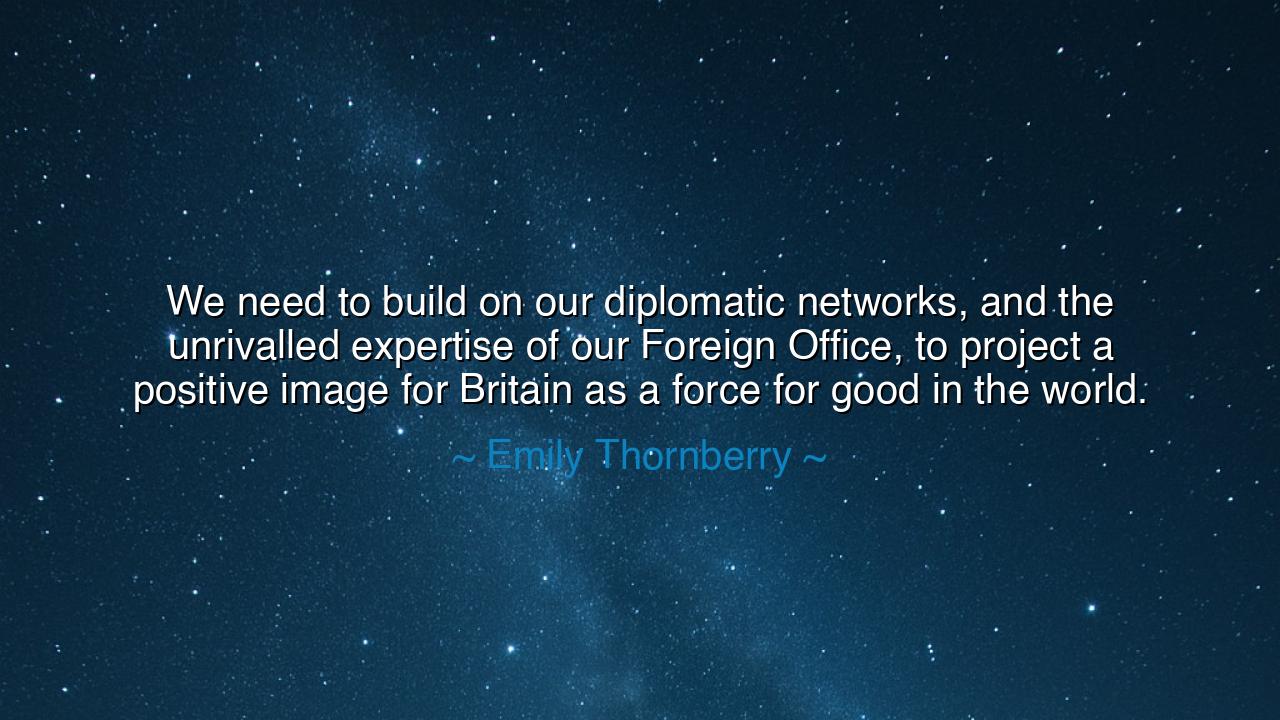
We need to build on our diplomatic networks, and the unrivalled
We need to build on our diplomatic networks, and the unrivalled expertise of our Foreign Office, to project a positive image for Britain as a force for good in the world.






The words of Emily Thornberry—“We need to build on our diplomatic networks, and the unrivalled expertise of our Foreign Office, to project a positive image for Britain as a force for good in the world”—ring like the counsel of a guardian urging her people to remember their noblest calling. At their heart lies a truth as old as empire and as enduring as civilization itself: nations are not judged by the strength of their swords alone, but by the radiance of the image they cast upon the world. The force for good is not measured only in victories of war, but in victories of trust, cooperation, and the healing of wounds between peoples.
The origin of this wisdom reaches back to the earliest days of statesmanship. From the courts of Mesopotamia to the city-states of Greece, rulers discovered that diplomatic networks were lifelines, weaving together rivals and allies in fragile harmony. The Greeks called it philia, the bonds of friendship, without which even mighty Athens or Sparta could not endure. Rome itself, though built by legions, was held together as much by diplomacy, alliances, and treaties as by steel. Thornberry’s call echoes these ancient lessons: true strength is not isolation, but connection, not brute force, but cultivated respect.
Consider the example of Benjamin Franklin, envoy of the fledgling United States to France during the American Revolution. The armies of Washington struggled, outnumbered and under-supplied. Yet it was Franklin’s skill in diplomacy—his ability to charm, persuade, and project a positive image of America as a nation striving for liberty—that secured French support. This alliance turned the tide of history. Without it, America’s cause might have withered. Thus we see that diplomacy, though often unseen, is a pillar upon which empires rise and fall.
The same truth resounds in the work of Dag Hammarskjöld, the Swedish Secretary-General of the United Nations during the Cold War. At a time when the world trembled on the edge of annihilation, he sought to make the UN a force for good, balancing competing powers, soothing conflict, and projecting hope when despair threatened to reign. He did not wield armies, but he wielded credibility, integrity, and the trust of nations. His example shows that the projection of a nation—or of humanity itself—is strongest when built upon moral authority.
The lesson for us is luminous: a nation’s image is its soul reflected outward. To be seen as a force for good requires not only words but deeds—deeds of generosity, fairness, and respect for others. If a country leans only upon its power, it may be feared, but it will never be beloved. If it cultivates diplomatic networks, nurtures expertise, and acts with wisdom, then its influence endures not by compulsion, but by admiration.
Practical wisdom calls each of us, too, to become diplomats in our own lives. For diplomacy is not the art of governments alone—it is the art of living among others. Build networks of trust in your community. Project a positive image by your words and actions. Listen to the voices of others before raising your own. Seek solutions that balance competing needs, rather than insisting always on victory. In this way, each citizen becomes an envoy of peace, and each household a foreign office of goodwill.
Thus, let Thornberry’s words be remembered not only as policy but as principle. Nations, like people, thrive when they embody connection, respect, and the will to do good. To be a force for good is not merely to declare it, but to live it—through alliances, through compassion, through integrity that cannot be bought nor broken. For when the world looks upon such a nation, it sees not only power, but light.






UVUyen Vo
Building diplomatic networks and utilizing expertise is essential, but can it overshadow the real work needed to be genuinely seen as a force for good? What does a 'positive image' truly mean in today’s world, where people are more skeptical of global powers? Should Britain be focusing more on the long-term impact of its policies rather than just how it’s perceived?
PTTu Phuc Thanh
I think Thornberry’s emphasis on diplomacy is valid, but isn’t projecting a positive image a double-edged sword? How can Britain avoid the risk of coming off as overly self-congratulatory or even hypocritical in its efforts to be seen as a 'force for good'? How do we balance the need for international influence with the reality of global challenges and conflicting interests?
TDCam Tu Do
This quote is an interesting perspective on Britain’s international role, but I wonder about the potential challenges. With so many international issues today, can Britain effectively project itself as a 'force for good' when there are global criticisms about colonial legacies and contemporary foreign policies? Is it enough to rely on diplomatic expertise, or should they focus on rebuilding trust through tangible deeds?
MNMinh Nguyen
I totally agree that Britain’s Foreign Office holds a wealth of expertise, but projecting a positive image also requires addressing the past. How can Britain’s diplomatic networks reshape global perceptions, especially in regions that may view Britain’s historical actions with skepticism? Is it enough to simply focus on image-building, or should they be taking concrete actions to back it up?
Tthenghiem096
Thornberry’s call to project a positive image for Britain is something many governments focus on. But how much of this depends on the actions of Britain on the world stage versus just the image they cultivate? Can diplomacy alone change the perception of a nation, or do we need to see more concrete actions that align with the idea of being a force for good?